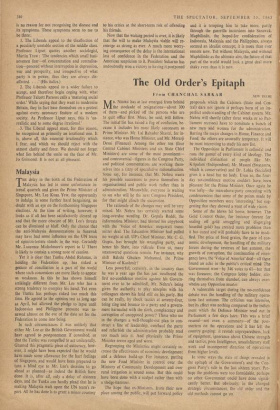The Old Order's Epitaph
From CHANCHAL SARKAR
NEW DELHI
MR. NEHRU has at last emerged from behind the stockade of resignations—about 300 of them—and picked off the persons who are to quit office first. More, he said, will follow. The initial list has raised a fog of confusion, be- cause it includes his most likely successors as Prime Minister. Mr. Lal Bahadur Shastri, for in- stance, who was Home Minister, and Mr. Morarji Desai (Finance). Among the other ten (four Central Cabinet Ministers and six State Chief Ministers) are some of the most prominent— and controversial—figures in the Congress Party, and political commentators are working them- selves into a tizzy of speculative rationalisation. Some say, for instance, that Mr. Nehru wants his possible successors to prove themselves in organisational and public work rather than in administration. Meanwhile, everyone is waiting to see who will be the next Congress President, for that might clinch the succession.
The rationale of the changes may well be very mixed. Mr. Nehru has certainly started some long-overdue weeding. Dr. Gopala Reddi, the Information Minister, had blotted his copybook with the 'Voice of America' megawatt trans- mitter deal. The Education Minister had pulled no weight at all. UP's Chief Minister, Mr. C. G. Gupta, has brought his wrangling party, and hence his State, into ridicule. Even so, many unanswered questions remain. For instance, why shift Bakshi Ghulam Mohamed, the Prime Minister of Kashmir?
Less powerful, certainly, in the country than he was a year ago (he has just weathered the first no-confidence motion against his Govern- ment ever to be admitted), Mr. Nehru's being given the authority to play ninepins with his colleagues shows his hold still on his party. But can he really, by shock tactics at seventy-four, bring zing and bounce to a party and a govern- ment barnacled with the sloth, complacency and corruption of unopposed power? Those who see in the changes a well-thought-out plan to con- struct a line of leadership, overhaul the party and refurbish the administration probably read too much into it. And physically the Prime Minister seems aged and worn.
Regrouping the Ministries might certainly in- crease the effectiveness of economic development and a defence build-up. For instance, putting the new Food Minister in control over the Ministry of Community Development and over rural irrigation is 'sound sense. But this could have been done with a scalpel rather than with a sledge-hammer.
The hope that ex-Ministers, from their new place among the public, will put forward policy proposals which the Cabinets (State and Cen- tral) dare not ignore is perhaps born of an im- perfect understanding of the Cabinet system. Mr. Nehru will shortly (after three weeks or so Par- liament recesses) have to nominate a bunch of new men and women for the administration. Barring the major changes in Home, Finance and Food, the others are avowedly temporary. It will be most interesting to study his new list.
The Opposition in Parliament is colloidal and runs the gamut of every kind of ideology. The individual distinction of people like Mr. Kripalani (Independent), Mr. Masani (Swatantra, which is conservative) and Dr. Lohia (Socialist) gives it a head but no body. Even so, the four- day no-confidence motion couldn't have been pleasant for the Prime Minister. Once again he was lofty--the man-above-party conceding with condescension that some of the points made by Opposition members were 'interesting,' but sug- gesting that they showed a want of wide vision.
Some of the blows hit home, however. The Gold Control Order, for instance (meant for sealing off gold smuggling and disgorging hoarded gold) has created more problems than it has cured and will probably have to be modi- fied. The price of food grains, the pace of eco- nomic development, the handling of the military forces during the reverses of last autumn, the growth of corruption, the continuation of emer- gency laws, the 'Voice of America' deal—all daze found an echo in the public's critical mind. The Government won—by 346 votes to 61—but that was foreseen; the Congress lobby fodder, stir- ring themselves from slumber, can always over- whelm any Oppostion muster.
A vulnerable target during the no-confidence debate was the handling of the military opera- tions last autumn. The criticism was intensive, but its effect was nothing compared to the indict- ment which the Defence Minister read out in Parliament a few days later. This was a brief resumd—not even a summary—of the post- mortem on the operations and it has left the country gasping: it reveals unpreparedness, lack of equipment, ignorance about Chinese strength and tactics, poor Intelligence, unsatisfactory staff work and incompetent direction of operations from higher levels.
In some ways the state of things revealed is the epitaph of the Government's and the Con- gress Party's rule in the last sixteen years. Per- haps the problems were too formidable, perhaps no other Government could have done signifi- cantly better. But obviously, in the changed strategic circumstances, the old order and the old methods cannot go on.






























 Previous page
Previous page